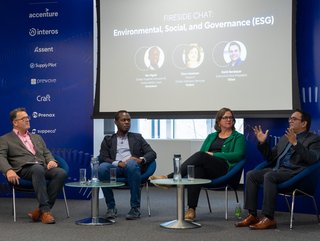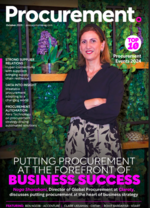Navigating ESG complexity in procurement

In today's world, everyone – staff, investors, stakeholders and customers – demand meaningful commitment on ESG compliance.
Yet, ESG can be a grey area. A report from SaaS data, research and technology company Pitchbook suggests there is a deal of variance in investors’ definitions of what constitutes a sustainable investment – meaning where one sees a legitimate sustainable investment, another might see greenwashing.
But whatever the complexities and grey areas, one thing is certain: ESG has become far more than the nice-to-have option it was not so long ago. Now, businesses are looking to ESG to help deliver competitive advantage in a tumultuous marketplace.
ESG was a hot topic at the most recent Procurement & Supply Chain LIVE event, held in London last Autumn. At that event, a discussion of ESG issues teased out many insights and advice on the subject.
The following is an edited version of this event, which involved three speakers:
Claire Lissaman (CL) is Head of Oxfam Advisory Services, an organisation that provides companies with guidance around sustainability and ESG best practice. Prior to this, Lissaman was Director of Content and Impact for the Common Objective Platform, a global tech solution for promoting sustainability in fashion.
Ben Ngobi (BN) is Global Supplier Inclusion & Sustainability Lead at Accenture, where he helps organisations embed ESG initiatives in their operations. Ngobi is also involved with several non-profit organisations around supplier inclusion and sustainability.
Rohit Bardaiyar (RB) is Executive VP of US-based digital consulting firm VDart, which is part of Accenture's Diverse Supplier Development Programme. As such, he engages with businesses owned by different ethnicities, women, persons with disabilities, members of the LGBTQ+ community, veterans, and others.
What is your organisation doing around ESG?
BN: At Accenture, we believe responsible business is integral to the future of our planet. We have a target to be net zero by 2025.
On protecting human rights in the supply chain, we work by the ten principles of the United Nations Global Compact, a global movement of sustainable companies and stakeholders. We communicate these supplier standards to all key suppliers.
On supplier diversity, our target is to develop 250 businesses globally by the end of 2023.
CL: Oxfam’s mission is to overcome poverty through trade, and we have environmental and carbon targets mainly around our shops and our offices. We have 600 shops in the UK. Our supply chain is mostly donated goods, but we also have our own product range. We also look very closely at the environmental and social impact of what we are buying.
On inequality, we strive to drive ESG through our own research on business & human rights, and on human rights & supply chains.
Often, businesses tell us that they know what they need to do on ESG but that they need help doing it, and that’s our role at Oxfam Advisory Service.
RB: VDart has 3,700 employees spread across 11 countries, so we have a pretty large global footprint. I would say that, from around 2020, ESG has become a primary focus and a key business imperative – and Accenture has helped here with its Diverse Supplier Development Programme. They are mentoring us on our ESG journey and helping us achieve competitive advantage through ESG compliance.
Our major ESG goals are helping eliminate hunger and gender inequality, while securing equal education for all. We’ve also created a five-year sustainability roadmap with help from Accenture.
How can companies drive ESG compliance in their supply chains?
CL: This is a crucial area for companies to focus on. If you don’t know where your products are coming from, you've got a serious business risk. I appreciate that some sectors have complex, fragmented supply chains.
In textiles for example, where does the cotton come from that ends up in the spinning mills? But someone always knows. There's always some way of doing it.
It would be nice if we had better governments that oversaw good regulation and a healthy culture of trade unions, because then workers, farmers and producers could stand up for their own rights. But a lot of the time, we don’t, so the onus is on businesses.
If businesses campaigned collectively for strong regulation and trade unions, this would make life much easier for them in terms of ESG compliance in the extended tiers of their supply chain.
It’s a challenging journey, and we need to work collectively towards change.
How can businesses struggling with ESG best be helped?
BN: To make headway on ESG you need to get senior leadership involvement, and you also need to reach out to people like me – people who are invested in helping businesses reduce their environmental impact.
There are also lots of nonprofits that can help, such as Minority Supplier Development UK, or the National Minority Supplier Development Council in the US.
CL: If you're struggling to develop an ESG strategy, you need clarity on what exactly is the problem. Maybe you simply don’t know where to start? Or perhaps there is resistance within the organisation?
One thing that is crucial is when you have an ESG policy, it must be embedded throughout the entire organisation. It’s no good just one or two departments having ownership. Involve stakeholders in the process, especially those impacted by the work you do
Do all aspects of ESG get equal consideration?
RB: ESG reporting is itself fairly new, and the problem in the early days was that many organisations were strong on environmental but less strong on social and governance, meaning there continued to be violations of human rights and slavery practices in their supply chain.
But, now, companies and countries cannot just look at one aspect and ignore others. Yet, we still see instances where companies are generally ESG-compliant but, at the same time, have been hit by a cybersecurity attack and have negotiated a massive ransomware settlement with unethical hackers.
- Accenture’s Wael Safwat joins P&SC LIVE DubaiProcurement Strategy
- Johnson & Johnson Tackling Emissions Across Supply ChainsSustainability
- How SAP is Using AI to Transform Supply Chain SolutionsTechnology & AI
- Why Procurement is Key to Unilever's Climate Transition PlanSustainable Sourcing







